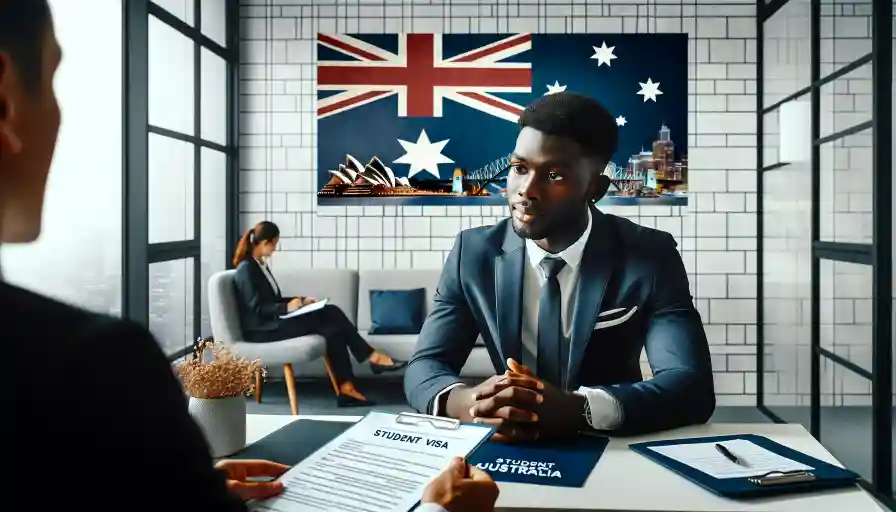If you are an international student but want to attend school in Australia, congrats on a solid choice. Australia is naturally a student-preferred study destination, so you are in good hands. This country also welcomes international students. If you have been given admission, the next thing is to obtain a visa. One of the processes in attending the visa application interview. It’s not a difficult stage but some students do not fail. In this post, I will tell you the most common Australian student visa interview questions and answers. You will be glad you came across this article as it will really help you pass the interview.
Now, Australia’s student visa approval is just over 90%. The figures you will find online do not align but they are all over 90%. The chance is that your application won’t be rejected if you answer the questions properly. Let’s get something straight. We will not discuss the exact answers you have to give, but we will guide you on how you can answer your questions. The goal is not to answer with a script but to be natural. Vida officers don’t even like it if your responses sound scripted.
So now, let’s move towards the question. Okay, to help you, I have created some categories for the question, and besides that, we have made a trick list that can help students convince their case officer and thus clear their interview.
Australian Student Visa Interview Questions and Answers

We are going to look at 5 major categories where the questions will come from at the embassy. So, you just have to apply your common knowledge to answer these questions correctly.
1. Why did you choose Australia?
The basic first question that is asked is about Australia.
a) Why did you choose Australia for your studies?
b) What is the reason? So, how can a student answer this?
Why is it that you chose Australia and not your home country or any other country? So, the basic purpose of this question is that the visa interview wants to know if you are moving to a country, do you have basic knowledge about this country or not? So, you must have a clear reason and you have to answer the question simply and honestly.
Now, here you can discuss the economy of Australia or what were the reasons based on which Australia is the best country, like its top education, and top healthcare. So, we can discuss these points here, and besides that, we can do a comparison of Australia with different countries, why it was not an option, and why we chose Australia. We can draw a comparison of Australia with your home country, such as how your home country is running and how a top-tier country like Australia is doing much better in that aspect.
2. Why did you choose this university?
So, we will now talk about the second aspect of Australian student visa interview questions and answers. The questions in the second category are about the educational institution you chose for your studies.
a) How much knowledge do you have about the school you have selected?
b) Do you know its name, address, and the city it’s in?
So, the basic purpose of this question is to know why you chose a specific institution for your course completion and whether you have enough knowledge about that school. As a student, I believe you know the complete name of the institution, its exact location, and the reasons for choosing it. For example, if your course is in IT and the institution is best known for IT, you can mention this reason. Similarly, you can discuss the institution’s rankings, accreditations, and awards to make your answer more convincing. You just need to have basic knowledge about your preferred institution, and also about the lifestyle of the city where the institution is located to make their answer more convincing.
3. Why did you choose your course of study?
Okay, next we have the third most important category of Australian student visa interview questions and answers. The questions in this category are about your course and why you think it is the course for you.
a) How important is the course you have selected for your studies?
b) How long is your course duration?
Be clear when you answer. For instance, say it’s a 2-year course or a 1-year course.
c) What are your course commencement and end dates?
Make sure to give a truthful answer, as these dates will be checked.
d. How much does the course cost you?
Give the exact total cost of the course. This number should not be an estimate. Just do the math before the interview.
e. How would this course benefit you?
The officer wants to know how much you’ve researched the course and how it will help your future career.
You should know how to answer any course-related questions asked by the case officer. The important question asked is that you should know the complete title of your course. What you need to know is whether it’s a diploma, degree, or certificate, exactly what it is. You should know the duration of your course, and its exact cost, all of which are mentioned in your offer letter. You should know why this course is so important for you. You can explain how this course is linked to your past work experience, how it will help you achieve your future goals, and what further studies you can pursue after this course. These are all the reasons students can include in their answers.
4. What are your plans when are in Australia?
Next, the questions that can be asked are about your plans in Australia. You could be asked a direct question like:What will you do during your break, or what are your plans after completing your course?
Are you planning to work part-time while studying in Australia?
You’re allowed to work up to 20 hours a week on an Australian student visa. Tell the officer if you plan to work part-time during your studies.
Any plans to work in Australia?
You can only work part-time on a student visa. Explain to the officer that you’ll follow these rules. If you are not planning to work in Australia, just say no. This question is actually very tricky. If you say, “Maybe,” your visa application can be denied. Just state clearly that you do not plan to work in Australia because you are on a study visa and not a work visa.
The visa officer will definitely ask if you plan to stay in the city for further studies or if you have any plans to settle in Australia. This is a tricky question, and some students often have their visa applications rejected as a result. You need to be very conscious because the visa interview essentially checks if the student plans to stay there after completing their studies. Since the interview is basically for a student visa, not for permanent residency, you should not show in your answer that you have plans to stay. You need to tell them that you are going there only for study purposes and will return to your home country after completing your studies and start your career there. Regarding semester breaks, you can discuss that you will either return to your home country or have plans to explore Australia.
5. How do you plan to fund your studies in Australia?
Let’s be honest, Australia might be one of the top-tier countries in the world but it also struggles financially. As such, this country is not willing to add to its situation any time soon. I believe that visa officers are particularly encouraged to filter out students who will have issues with funding. So, if you give the impression of a lack of funds, the embassy will reject your application. You will be asked about your financial situation.
Students need to know their sponsor’s occupation, their annual income, and all these details. There should be no discrepancy between what you verbally communicate and what’s on your documents. What you say should be present in your documents because the visa interview will check all your details. You need to answer these questions confidently.
If they ask for details, you are expected to give a detailed answer. If they ask a pointed question, answer to the point. These are all the tips that if followed by students, will increase their chances of visa approval.
Helpful Tips During Australia Student Visa Interview
We have looked at the questions you are very likely to encounter. Now, let’s look at the pre-question tips that will help you to prepare to ace this interview.
1. Arrive Early for the Interview
Being punctual is crucial. Arriving a few minutes before your interview is ideal. It’s important to be on time and approach the interview with confidence.
2. Make Sure to Greet the Visa Officer as Necessary
When you meet the case officer, make sure to greet them properly. This can help create a positive first impression.
3. Dress in Simple and Corporate Attire
Dress formally and simply. It’s important to feel confident and comfortable in your attire, so avoid anything too extravagant.
4. Bring in Your Documents
Ensure you carry all your supporting documents. Double or triple-check to make sure you have everything you need.
5. Be Honest
Answer the questions sincerely and honestly. Keep your answers brief and to the point, avoiding unnecessary details.
6. Keep Your Responses Detailed and Concise
Your answers should be consistent with the documents you submitted with your visa application. Respond thoroughly and concisely, providing necessary information without over-elaborating.
7. Consider Your Response Before Saying It Out
Take time to understand each question before answering. Listen carefully to the case officer’s questions and respond thoughtfully.
Conclusion
So, we have looked at the common Australian student visa interview questions and answers that you are likely to face. You do not need any script for this interview. You just need to deliver your answers in a way that shows that you do not intend to abuse the study visa and work in Australia. If you follow these points, you can easily clear your interview. I decided to break down the questions into 5 simple main questions to give you an idea of what you expect.
Read Also: How to Study in Australia for Free



